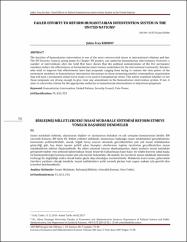| dc.contributor.author | Kırdım, Şahin Eray | |
| dc.date.accessioned | 2018-02-14T07:08:36Z | |
| dc.date.available | 2018-02-14T07:08:36Z | |
| dc.date.issued | 2017 | |
| dc.identifier.citation | Kırdım, Ş . (2017). Birleşmiş Milletlerdeki İnsani Müdahale Sistemini Reform Etmeye Yönelik Başarısız Denemeler . Afyon Kocatepe Üniversitesi İktisadi ve İdari Bilimler Fakültesi Dergisi , 19 (1) , 75-85 | |
| dc.identifier.uri | http://iibfdergi.aku.edu.tr/wp-content/uploads/2017/06/19_1_Makale-6.-S%CC%A7ahin-Eray-K%C4%B1rd%C4%B1m.pdf | |
| dc.identifier.uri | http://hdl.handle.net/11630/4785 | |
| dc.identifier.uri | https://dergipark.org.tr/tr/pub/akuiibfd/issue/29881/321948 | |
| dc.description.abstract | The doctrine of humanitarian intervention is one of the most controversial issues in international relations and law.
The UN Security Council, acting under its Chapter VII powers, can authorize humanitarian interventions. However, a
number of interventions after the Cold War have shown that the political considerations of the five permanent
members reduce the effectiveness of humanitarian interventions undertaken by the international community. Scholars
who wish to improve this effectiveness have had proposals ranging from trying to remove the veto power of the
permanent members in humanitarian intervention discussions to those proposing another cosmopolitan organization
that will have a permanent armed force ready to be used in humanitarian crises. This article examines whether or not
those proposals are strong enough to give raise any amendment in the humanitarian intervention system. If not, it
aims to extract the criteria for the appropriate authority in humanitarian interventions to help future proposals. | en_US |
| dc.description.abstract | İnsani müdahale doktrini, uluslararası ilişkiler ve uluslararası hukukun en çok tartışılan konularından biridir. BM
Güvenlik Konseyi, BM Şartı VII. Bölüm yetkileri dahilinde, uluslararası topluluğu insani müdahaleleri gerçekleştirme
konusunda yetkilendirebilir. Ancak, Soğuk Savaş sonrası dönemde gerçekleştirilen pek çok insani müdahalenin
gösterdiği gibi, beş daimi üyenin politik çıkar hesapları uluslararası toplum tarafından gerçekleştirilen insani
müdahalelerin etkisini düşürmektedir. Bu etkiyi artırmak isteyen akademisyenler, daimi üyelerin insani müdahale
görüşmelerindeki veto yetkisini kaldırmaktan insani krizlerde kullanılmaya hazır kalıcı bir silahlı kuvvete sahip başka
bir kozmopolit örgüt kurmaya kadar pek çok öneride bulundular. Bu makale, bu önerilerin insani müdahale sisteminde
herhangi bir değişikliğe neden olacak kadar güçlü olup olmadığını incelemektedir. Makalenin temel amacı, gelecekteki
önerilere yardımcı olacağı ümidiyle, insani müdahalelere yetki vermek gücüne haiz uygun makam için gerekli olan
kriterleri belirlemektedir. | en_US |
| dc.language.iso | eng | en_US |
| dc.publisher | Afyon Kocatepe Üniversitesi | en_US |
| dc.identifier.doi | 10.5578/jeas.50686 | en_US |
| dc.rights | info:eu-repo/semantics/openAccess | en_US |
| dc.subject | Humanitarian Intervention | en_US |
| dc.subject | United Nations | en_US |
| dc.subject | Security Council | en_US |
| dc.subject | Veto Power | en_US |
| dc.title | Failed efforts to reform humanitarian intervention system in the united nations | en_US |
| dc.title.alternative | Birleşmiş Milletlerdeki insani müdahale sistemini reform etmeye yönelik başarısız denemeler | en_US |
| dc.type | article | en_US |
| dc.relation.journal | İktisadi ve İdari Bilimler Fakültesi Dergisi | en_US |
| dc.identifier.volume | 19 | en_US |
| dc.identifier.startpage | 75 | en_US |
| dc.identifier.endpage | 85 | en_US |
| dc.identifier.issue | 1 | en_US |
| dc.relation.publicationcategory | Makale - Ulusal Hakemli Dergi - Kurum Yayını | en_US |



















